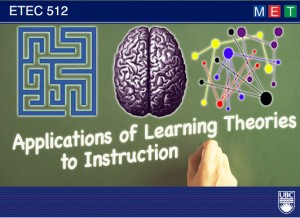ETEC 512
Applications of Learning
Theories to
Instruction
” You can teach a student a lesson for a day; but if you can teach him to learn by creating curiosity, he will continue the learning process as long as he live.” –Clay P. Bedford
“In this course, students learn to recognize major learning theories and apply them to specific instructional situations in an effort to solve instructional design problems. Beginning with an investigation of personal learning strategies, students take what they have learned and apply it to their own settings.” UBC, MET Program.
One of the most meaningful assignments from ETEC 512 was writing my Personal Learning Theory. We wrote our thoughts and ideas at the beginning of the course ETEC 512Personal Learning Theory and then revisited them near the end ETEC 512Personal Learning Theory, Revisited final.
The transformation of my ideas is in my understanding and application. At the end of the course my knowledge of the various learning theories is evidently transformative through my reflective practices that involve daily analyzing and synthesizing. This supports and helps to answer the question, ” How can instruction address the individual learner?” This course has provided the knowledge and understanding.
After reading about ‘Learning Theories’ and reflecting how they apply to my teaching pedagogies, I am more aware of which pedagogical practices are ideal to address the following considerations.
1. Cognitive Constructivist Teaching Strategies
2. Cooperative and collaborative learning environments
3. Diversity with a social learning constructivist learning environment
One of the assignments in ETEC 512 is a Concept Map . The objective of the Concept Map is to create a personalized representation of one’s understanding of the connections and relationships of the many diverse learning theories.
Another assignment that I thoroughly enjoyed was a collaborative group project entitled, Technology and Learning using Weebly as the platform. Our group worked incredible well together and creatively designed an online lesson illustrating an aspect of learning using technology. Check it out!
“Through others, we become ourselves.” – L. S. Vygotsky
References
Vygotsky, L. (1997). The Collected Works of L. S. Vygotsky. Vol. 4. The History of the Development of Higher Mental Functions (1931), trans. Marie J. Hall. New York: Plenum.
Read more: Lev Vygotsky (1896–1934) – Cultural-Historical Theory, Education and Cognitive Development – Thinking, Functions, Psychology, and Self – StateUniversity.com http://education.stateuniversity.com/pages/2539/Vygotsky-Lev-1896-1934.html#ixzz1pRki5DGc
Click on the image below to return to the MET journey page.

